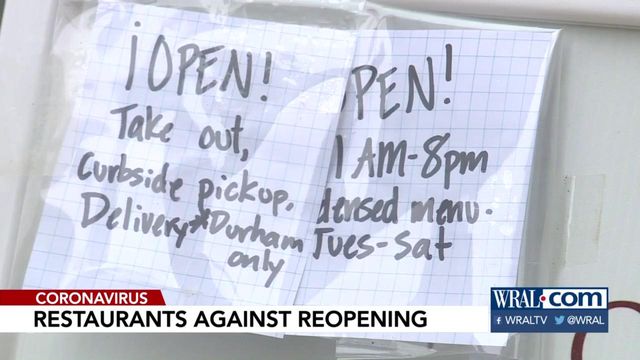In letter, restaurant owners prefer takeout, delivery status quo to partial reopen plan
In a letter to Gov. Roy Cooper, North Carolina's Congressional delegation and local mayors, a group of 40 restaurant owners challenged the governor's phased reopening plan, saying a partial opening, with limited seats for dining, "could mean the death of independently owned full-service restaurants."
Posted — UpdatedUnder Cooper's three-part plan to get the state back to business, phase two would allow for limited opening of restaurants, bars, gyms and other businesses, but with safety protocols and reduced capacity. It is that limit that the owners say would "make it impossible to generate enough revenue to survive."
In the letter, the owners ask political leaders to keep restaurants on a takeout and delivery basis until they can safely operate at full capacity.
Owners have noted proposals floated in other states that would require restaurants to limit dine-in customers to half their capacity or to create six feet of space between tables.
"A lot of us independent, mid-size, full-service restaurant owners thought about that, and realized it’s just not a sustainable model. We can’t be profitable under those regulations," said Shawn Stokes, chef and co-owner of Luna Rotisserie, which has locations in downtown Durham and in Carrboro.
Restaurants, the letter points out, have costs for property, wages and ingredients that must be paid even if fewer customers are allowed to dine on-site.
"If we open for half of our guests or all of our guests, either way, I need to have a host to receive and seat those guests. I need to have bartenders to run the bar to make drinks for the guests. I need to have servers," said Elizabeth Turnbull, co-owner of Copa in downtown Durham. "That number of staff is about the same, at half capacity or at full capacity. There are just certain positions that you need to fill. You can’t have half a host. You can’t have half a bartender."
"We typically depend on lots of volume to generate enough revenue to make a profit and to stay in business," Stokes said. "With curbside pick-up ... those who are (doing it) are able to at least stay afloat."
He worries that limited seating would suppress some business now being generated by pick-up and delivery orders. In addition, a partially open dining room would keep some restaurant employees on the sidelines and would mean less support for local vendors of meats and produce, the letter said.
"Rather than reopen under conditions that would almost certainly ensure failure, we ask that you help us maintain the status quo of curbside takeout and delivery service until we can operate safely at full capacity," the owners wrote.
He said the goal is simple: "We would like to open at full capacity as soon as possible, and as soon as it’s safe," he said.
If Cooper sticks to his plan for limited seating, the restaurant owners are hoping additional help in the form of rent or mortgage abatements or help with other costs.
"If restaurants fail, if we don’t get the aid that we need to make it through, then it’s not just that you’re going to have fewer places to eat out. You’re going to have fewer small businesses across the board in many different industries," Turnbull said.
• Credits
Copyright 2024 by Capitol Broadcasting Company. All rights reserved. This material may not be published, broadcast, rewritten or redistributed.






